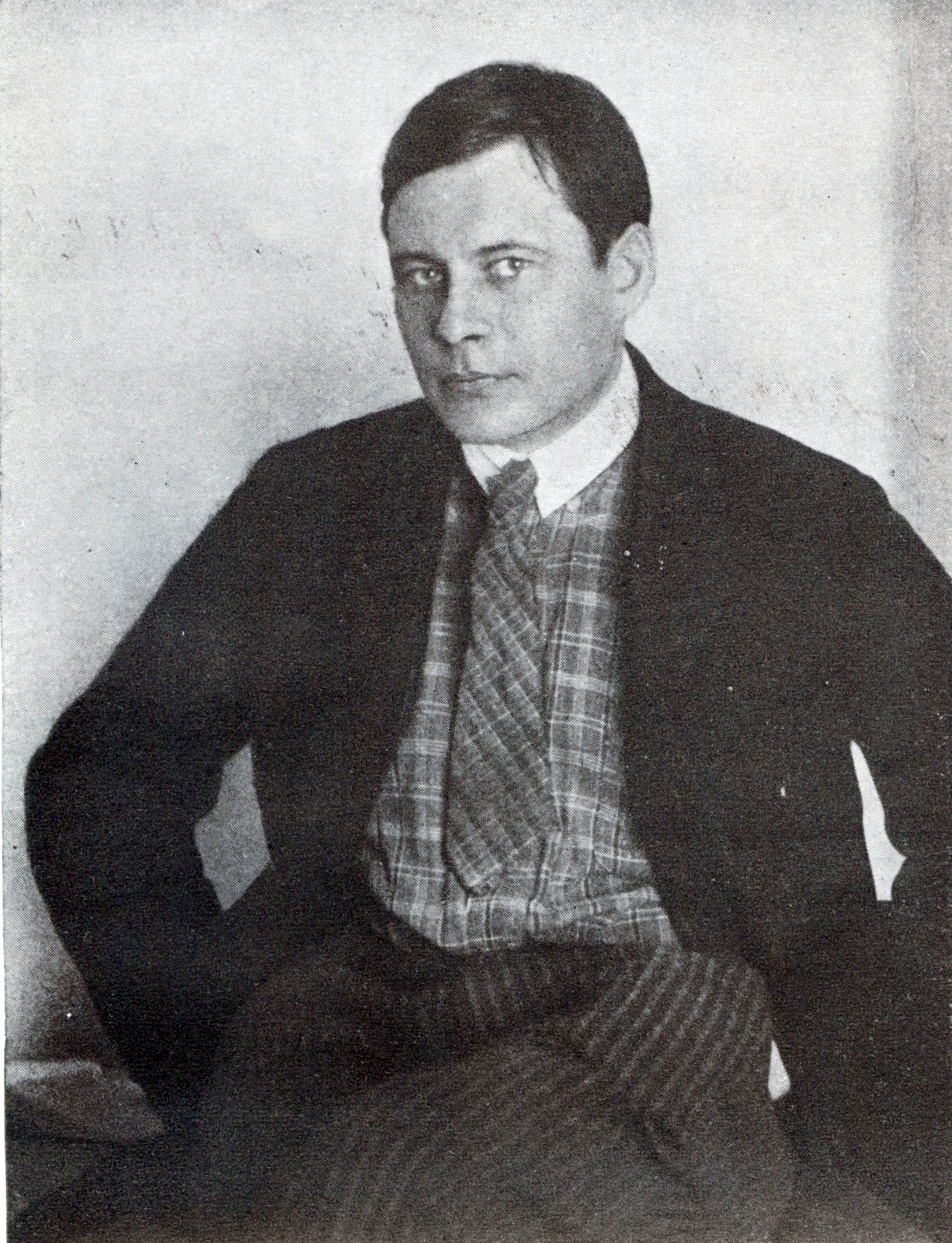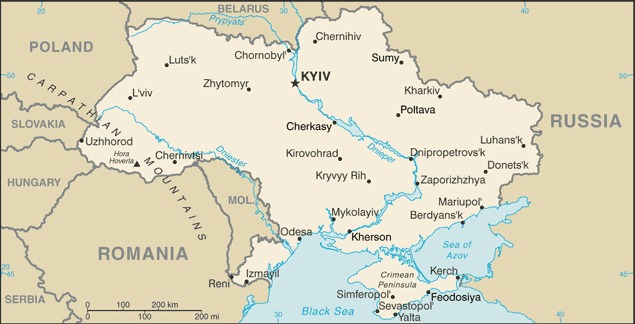|
Maik Yohansen
Maik (Mykhailo) Hervasiiovych Yohansen or Mike Johansen ( uk, Майк Гервасійович Йогансен; pseudonyms Villi Vetselius illy Wetzeliusand M. Kramar; 16 October 1895, Kharkiv, Ukraine – 27 October 1937, Kyiv, Ukraine) – was a Ukrainian poet, prose writer, dramatist, translator, critic and linguist. He was one of the founders of VAPLITE. Biography Maik Yohansen was born on 16 October 1895 in Kharkiv. His father, a Latvian emigrant was a teacher of German, and made sure his son had a proper education. Maik Yohansen received his secondary education at the Kharkiv Third Gymnasium. There he studied along with Hryhoriy Petnikov and Bohdan Hordeev (pseudo: Bozhydar), who later became well-known poet-futurists, as well as with Yuriy Platonov – a geographer and prose writer. Afterwards, Maik Yohansen studied at the Kharkiv University, which he successfully graduated in 1917, specialising in Latin. At Kharkiv University Maik Yohansen's linguistics lecturers in ... [...More Info...] [...Related Items...] OR: [Wikipedia] [Google] [Baidu] |
Union Of Soviet Writers
The Union of Soviet Writers, USSR Union of Writers, or Soviet Union of Writers (russian: Союз писателей СССР, translit=Soyuz Sovetstikh Pisatelei) was a creative union of professional writers in the Soviet Union. It was founded in 1934 on the initiative of the Central Committee of the Communist Party (1932) after disbanding a number of other writers' organizations, including Proletkult and the Russian Association of Proletarian Writers. The aim of the Union was to achieve party and state control in the field of literature. For professional writers, membership of the Union became effectively obligatory, and non-members had much more limited opportunities for publication. The result was that exclusion from the Union meant a virtual ban on publication. However, the history of the Union of Writers also saw cases of voluntary self-exclusion from its cadre. Thus, Vasily Aksenov, Semyon Lipkin, and Inna Lisnyanskaya left the Union of Writers in a show of solidarity aft ... [...More Info...] [...Related Items...] OR: [Wikipedia] [Google] [Baidu] |
Ukrainian Language
Ukrainian ( uk, украї́нська мо́ва, translit=ukrainska mova, label=native name, ) is an East Slavic language of the Indo-European language family. It is the native language of about 40 million people and the official state language of Ukraine in Eastern Europe. Written Ukrainian uses the Ukrainian alphabet, a variant of the Cyrillic script. The standard Ukrainian language is regulated by the National Academy of Sciences of Ukraine (NANU; particularly by its Institute for the Ukrainian Language), the Ukrainian language-information fund, and Potebnia Institute of Linguistics. Comparisons are often drawn to Russian, a prominent Slavic language, but there is more mutual intelligibility with Belarusian,Alexander M. Schenker. 1993. "Proto-Slavonic," ''The Slavonic Languages''. (Routledge). pp. 60–121. p. 60: " hedistinction between dialect and language being blurred, there can be no unanimity on this issue in all instances..."C.F. Voegelin and F.M. Voegelin. 19 ... [...More Info...] [...Related Items...] OR: [Wikipedia] [Google] [Baidu] |
Cinema Of Ukraine
Ukrainian cinema comprises the art of film and creative movies made within the nation of Ukraine and also by Ukrainian film makers abroad. Despite a history of important and successful productions, the industry has often been characterized by a debate about its identity, the level of Russian and European influence. Ukrainian producers are active in international co-productions, while Ukrainian actors, directors and crew feature regularly in Russian (and formerly Soviet) films. Successful films have been based on Ukrainian people, stories or events, including Battleship Potemkin, Man with a Movie Camera, and Everything Is Illuminated. The Ukrainian State Film Agency owns National Oleksandr Dovzhenko Film Centre, film copying laboratory and archive, and takes part in hosting of the Odesa International Film Festival. Another festival, Molodist in Kyiv, is the only FIAPF accredited International Film Festival held in Ukraine; the competition program has sections for student fi ... [...More Info...] [...Related Items...] OR: [Wikipedia] [Google] [Baidu] |
Zvenigora
''Zvenigora'' (russian: Звeнигopа) is a 1928 Soviet silent film by Ukrainian director Alexander Dovzhenko, first shown on 13 April 1928. This was the fourth film by Dovzhenko, but the first one which was widely reviewed and discussed in the media. This was also the last film by Dovzhenko for which he was not the sole scriptwriter. Cast * Georgi Astafyev as Scythian leader (as G. Astafyev) * Nikolai Nademsky as Grandpa / General * Vladimir Uralsky as Peasant * Aleksandr Podorozhny as Pavlo - second grandson (as Les Podorozhnij) * Semyon Svashenko as Timoshka - first grandson * I. Selyuk as Ataman * L. Barné as Monk * L. Parshina as Timoshka's wife * P. Sklyar Otawa as Okasana - Mountain Princess * A. Simonov as Cossack Officer Production The script was originally written by Maike "Mike" Johansen and Yurtyk (Yuri Tiutiunnyk), but eventually Dovzhenko heavily rewrote the script himself and removed Johansen and Tyutyunnyk's names from the screenplay and did n ... [...More Info...] [...Related Items...] OR: [Wikipedia] [Google] [Baidu] |
Alexander Dovzhenko
Oleksandr Petrovych Dovzhenko or Alexander Petrovich Dovzhenko ( uk, Олександр Петрович Довженко, ''Oleksandr Petrovych Dovzhenko''; russian: Алекса́ндр Петро́вич Довже́нко, ''Aleksandr Petrovich Dovzhenko''; November 25, 1956), was a Ukrainian Soviet screenwriter, film producer and director. He is often cited as one of the most important early Soviet filmmakers, alongside Sergei Eisenstein, Dziga Vertov, and Vsevolod Pudovkin, as well as being a pioneer of Soviet montage theory. Biography Oleksandr Dovzhenko was born in the hamlet of Viunyshche located in the Sosnitsky Uyezd of the Chernihiv Governorate of the Russian Empire (now part of Sosnytsia in Chernihiv Oblast, Ukraine), to Petro Semenovych Dovzhenko and Odarka Yermolayivna Dovzhenko. His paternal ancestors were Ukrainian Cossacks (Chumaks) who settled in Sosnytsia in the eighteenth century, coming from the neighbouring province of Poltava. Oleksander was the sev ... [...More Info...] [...Related Items...] OR: [Wikipedia] [Google] [Baidu] |
Edgar Allan Poe
Edgar Allan Poe (; Edgar Poe; January 19, 1809 – October 7, 1849) was an American writer, poet, editor, and literary critic. Poe is best known for his poetry and short stories, particularly his tales of mystery and the macabre. He is widely regarded as a central figure of Romanticism in the United States, and of American literature. Poe was one of the country's earliest practitioners of the short story, and considered to be the inventor of the detective fiction genre, as well as a significant contributor to the emerging genre of science fiction. Poe is the first well-known American writer to earn a living through writing alone, resulting in a financially difficult life and career. Poe was born in Boston, the second child of actors David and Elizabeth "Eliza" Poe. His father abandoned the family in 1810, and when his mother died the following year, Poe was taken in by John and Frances Allan of Richmond, Virginia. They never formally adopted him, but he was with them well ... [...More Info...] [...Related Items...] OR: [Wikipedia] [Google] [Baidu] |
William Shakespeare
William Shakespeare ( 26 April 1564 – 23 April 1616) was an English playwright, poet and actor. He is widely regarded as the greatest writer in the English language and the world's pre-eminent dramatist. He is often called England's national poet and the " Bard of Avon" (or simply "the Bard"). His extant works, including collaborations, consist of some 39 plays, 154 sonnets, three long narrative poems, and a few other verses, some of uncertain authorship. His plays have been translated into every major living language and are performed more often than those of any other playwright. He remains arguably the most influential writer in the English language, and his works continue to be studied and reinterpreted. Shakespeare was born and raised in Stratford-upon-Avon, Warwickshire. At the age of 18, he married Anne Hathaway, with whom he had three children: Susanna, and twins Hamnet and Judith. Sometime between 1585 and 1592, he began a successful career in London as an ... [...More Info...] [...Related Items...] OR: [Wikipedia] [Google] [Baidu] |
Friedrich Schiller
Johann Christoph Friedrich von Schiller (, short: ; 10 November 17599 May 1805) was a German playwright, poet, and philosopher. During the last seventeen years of his life (1788–1805), Schiller developed a productive, if complicated, friendship with the already famous and influential Johann Wolfgang von Goethe. They frequently discussed issues concerning aesthetics, and Schiller encouraged Goethe to finish works that he had left as sketches. This relationship and these discussions led to a period now referred to as Weimar Classicism. They also worked together on ''Xenien'', a collection of short satirical poems in which both Schiller and Goethe challenge opponents of their philosophical vision. Early life and career Friedrich Schiller was born on 10 November 1759, in Marbach, Württemberg, as the only son of military doctor Johann Kaspar Schiller (1733–1796) and Elisabetha Dorothea Schiller (1732–1802). They also had five daughters, including Christophine, the eldest. ... [...More Info...] [...Related Items...] OR: [Wikipedia] [Google] [Baidu] |
Lukyanivka (neighborhood)
Lukyanivka ( uk, Лук'янівка) is a historical neighborhood in the northwestern part of the city of Kyiv, the capital of Ukraine. It is situated on the right bank of Dnieper, at a short distance from Babi Yar (part of Kurenivka). The Kyiv Metro station located in the neighborhood is Lukianivska, on the Syretsko-Pecherska Line. The area is also known for the Lukyanivska Prison. The neighborhood was named after a Podil guildmaster and "began to grow after the great flood of 1845 forced many inhabitants to higher ground"; its population in 1874 was 9,806. In the spring of 1911, the body of Andrei Yushchinsky was found in a cave in Lukyanivka, leading to the Mendel Beilis case. The Kyiv TV Tower was built on top of the Jewish cemetery in Lukianovka. The cemetery was officially closed in 1966 and Jewish families were given six months to rebury their relatives in the Jewish areas of a new cemetery in the city. Since the relatives of the interred had been killed in the Babi ... [...More Info...] [...Related Items...] OR: [Wikipedia] [Google] [Baidu] |
Soviet Union
The Soviet Union,. officially the Union of Soviet Socialist Republics. (USSR),. was a transcontinental country that spanned much of Eurasia from 1922 to 1991. A flagship communist state, it was nominally a federal union of fifteen national republics; in practice, both its government and its economy were highly centralized until its final years. It was a one-party state governed by the Communist Party of the Soviet Union, with the city of Moscow serving as its capital as well as that of its largest and most populous republic: the Russian SFSR. Other major cities included Leningrad (Russian SFSR), Kiev (Ukrainian SSR), Minsk ( Byelorussian SSR), Tashkent (Uzbek SSR), Alma-Ata (Kazakh SSR), and Novosibirsk (Russian SFSR). It was the largest country in the world, covering over and spanning eleven time zones. The country's roots lay in the October Revolution of 1917, when the Bolsheviks, under the leadership of Vladimir Lenin, overthrew the Russian Provisional Government ... [...More Info...] [...Related Items...] OR: [Wikipedia] [Google] [Baidu] |
Military Collegium Of The Supreme Court Of The Russian Federation
The Military Collegium of the Supreme Court of Russia (russian: Военная коллегия Верховного суда Российской Федерации) is a special military tribunal subordinated to the Supreme Court and is directly by a higher tribunal in relation to the district (naval) military courts. Powers Military collegium is considering in the first instance: *cases on challenging non-normative President of Russian Federation, normative acts of the Russian Federation, the Russian Ministry of Defense, other federal bodies of executive power, in which federal law provides for military service on the rights, freedoms and legitimate interests of servicemen, citizens undergoing military training; *cases of crimes committed which accused the judge of the military court, if they declared a petition, as well as crimes of particular complexity of the case or of special public importance that the Military Collegium of the right to take to its production in the prese ... [...More Info...] [...Related Items...] OR: [Wikipedia] [Google] [Baidu] |






